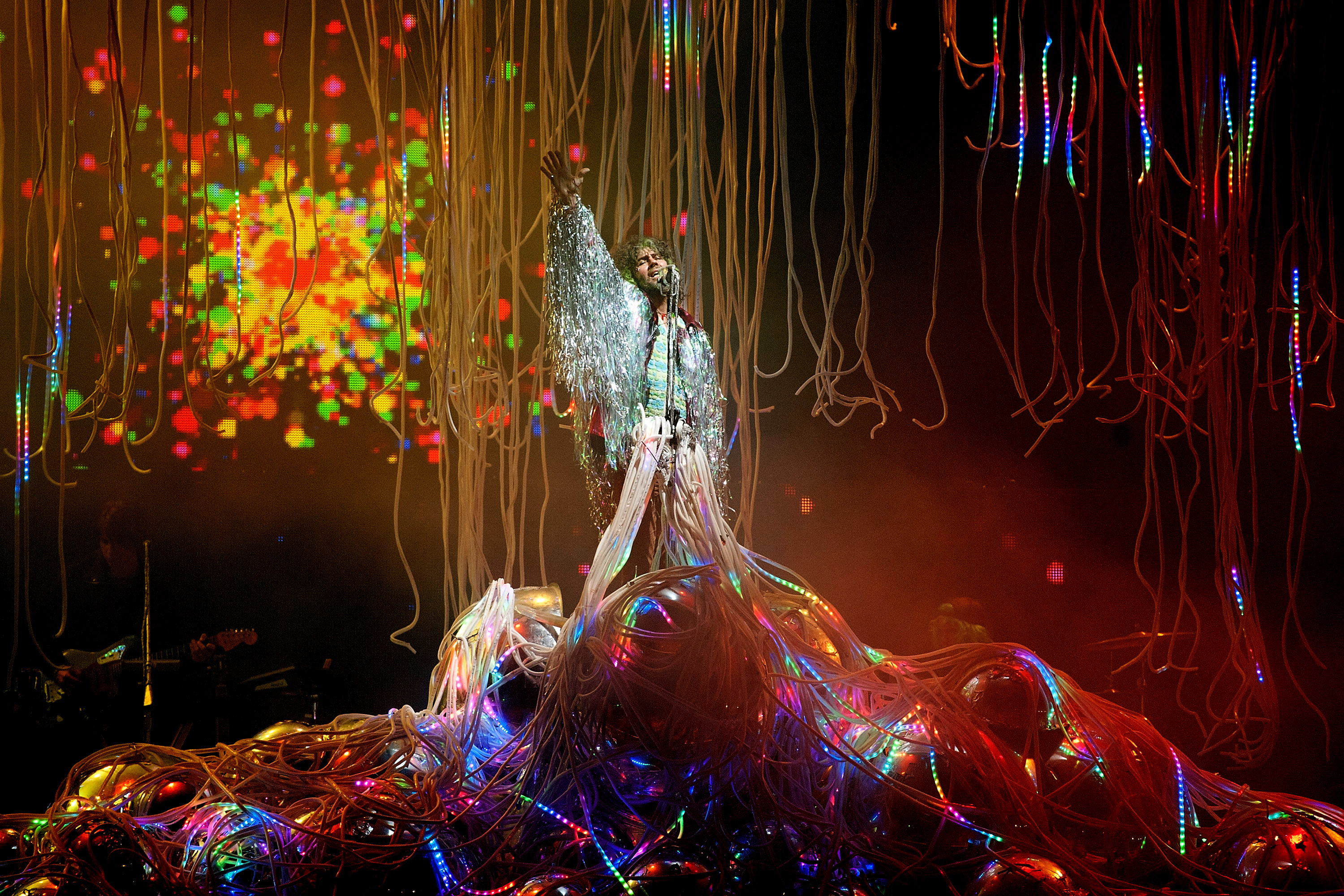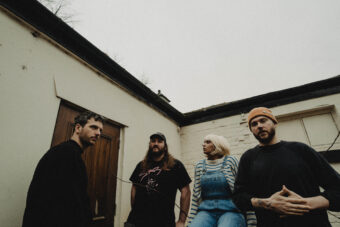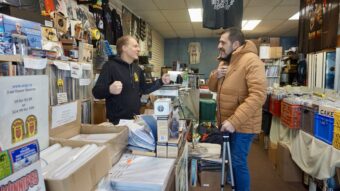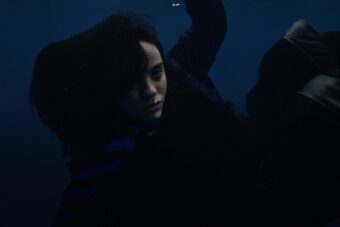This story originally appeared in the November 2009 issue of Spin. To mark the Record Store Day release of the beloved psych-pop band’s new album, King’s Mouth, we’re republishing it here.
During the spring of 1994, while the Flaming Lips were barnstorming across America, convincing radio programmers and their own label that a brain-fryingly weird pop tune, “She Don’t Use Jelly,” from their album Transmissions From the Satellite Heart, could be a hit, I was engaged in a middle-class rite of passage, backpacking across Europe. Drawn by equally healthy doses of American Jewish guilt and morbid curiosity, I spent a chilly afternoon touring Terezín, a former Nazi concentration camp 40 minutes outside Prague where more than 30,000 Jews died.
This was all obviously upsetting, but the one detail I recall most clearly is the sign that adorned the entrance: Arbeit macht frei. Translated literally, it means “Work makes free.” It was, of course, just insidious propaganda—hard work wasn’t going to save anyone there—but the phrase, disturbingly, stuck with me. After all, the idea that working your ass off could lead to freedom—if not the physical kind, then financial, intellectual, or spiritual—is an idea worth believing in and one that feels, in a way, quintessentially American.
Fifteen years later, I’m standing onstage at Atlanta’s Chastain Park Amphitheater surrounded by work. Shaggy dudes in bright orange shirts and matching pants scurry, pushing monitors, carrying guitars, and scaling the massive orange video right that dominates the stage. Flaming Lips bassist Michael Ivins, 46, guitarist-keyboardist Steven Drozd, 40, and drummer Clip Schurlock, 36, are each intently setting up their gear. Behind the video rig, Lips frontman Wayne Coyne, 48, crouches alongside the band’s stage manager, a red-haired guy named Shane, jiggling wires attached to a large cabinet of electronic equipment.
“This unit controls our video stuff,” Coyne tells me. “We’ve got this huge LED screen, but we’ve been having problems with the brightness.” He walks to the front of the stage, then looks back at the screen and shouts in Shane’s direction: “Take the contrast all the way down, then up again.” Coyne hops off the stage and backpedals a few paces. Orange and yellow hues pulsate from the screen. “If that’s looking bad, that actually looks pretty awesome.”
Coyne is wearing gray stripped pants and a weathered polo-style shirt over his thin frame. His curly mane of dark gray hair and a scraggly salt-and-pepper beard give him the real bearing of a Shakespearean king, but his tendency toward perpetual motion veers closer to Woody Allen. When I tell him the story about my trip to Terezín and the words over the camp gate, he laughs at the implicit comparison between the Lips and the Nazis, then warms to the idea.
“That is a great slogan,” he concedes. “And it definitely does apply to my life. I don’t know if work makes you free, but if you’re willing to take changes, follow your convictions, or any of that bullshit, you can be happy.”
Coyne presides over the crew here like a genial site supervisor, mostly wandering around ensuring everything is functioning, but quick to get his hands dirty should a problem arise. He and Ivins, the Lips’ only other original member, usually arrive at the venue between eight and ten on the morning of a show. While the Lips travel with a nine-person road crew, there is almost no aspect of the tour Coyne isn’t involved in or couldn’t do himself if he had enough hands.
“The idea that you just make the music and some guys set up all your stuff—that works great for Thom Yorke,” Coyne says. “But for me, everything we do up there is about us. From the dumb carpet we stand on to the video. I’d just be too frazzled if I wasn’t up there making sure all these little things go right.”
Since the band’s beginnings back in Oklahoma City in the early ’80s, he and Ivins have kept things exceedingly DIY. Coyne has designed most of the album art. His wife Michelle does the band’s photos. HIs nephew Dennis used to be a member of the road crew and now fronts his own Lips-is band (with two other ex-roadies), called Stardeath and White Dwarfs, who happen to be one of the opening acts on this tour. In fact, the earliest version of today’s temperamental video rig was built by Coyne in his backyard. Shane climbs down off it, carrying needle-nose pliers, which he later explains to me are used to open and close the LED screen door at the beginning of the show. (“It’s made for soldering, but, y’know, necessity is the mother of invention.”)
I am also introduced to, among other jury-rigged gizmos, the balloon inflator Coyne fashioned from a leaf blower and a plastic bottle spout (see sidebar). Coyne is a big fan of duct tape—he spends about $10,000 annually on it. “Duct tape and failure have shown us the way,” he says.
If Coyne is the crew’s foreman, Ivins sees himself as just another grunt. With his bald pate, groomed beard, and small, intense bespectacled eyes, he looks more like a tenured physics professor than a rock star, yet seemingly longs to be a roadie. (“One day there’s going to be a headline,” jokes Drozd. “MICHAEL IVINS QUITS FLAMING LIPS TO JOIN FLAMING LIPS ROAD CREW.”)
Tonight’s gig is one of a handful of summer dates the Lips are playing across the U.S., part promotional jaunt in anticipation of their 12th studio album, Embryonic, part victory lap celebrating the band’s unlikely success over the past decade. Combined, their last three albums have sold more than a million copies and their live show has become rock’s must-see equivalent of a three-ring circus. Coyne likes to credit the success largely to “dumb luck”—his attempt at humility as admirable, but it’s also bullshit. He’s built a modest empire (“We’ve made millions,” he admits, “but it’s not about that”) performing tasks other artists might consider beneath them.
“I know if I’m going to give it my energy and time, we’re going to climb the mountain,” he says, typically discursively. “We may get to the top of the mountain, discover it’s a fucking volcano, and fall in, but whatever it is we’re trying to do, we’re going to be able to do it.”
A few hours later, the amphitheater is nearly full, and the opening bands have finished their sets. Drozd, Ivins, Scurlock, and touring guitarist-percussionist Derek Brown plug in and tune their instruments in full view of the crowd. It’s a weird anti-specticale: Watching the Lips tune up—not to mention hearing Coyne explain to the crowd that he’s going to come out into that audience in his famous plastic space bubble, so they’ll need to be ready to hold him up—seems as though it’ll render their grand entrance anticlimactic.
But as Coyne puts it, “I’ve always viewed this as part of the show. You’re gonna see us set up our stuff, see exactly how this works. You are gonna know that this is not magic. And yet, when the music starts, it’s still gonna destroy you.”
Around 9:30, the band retreats for a few seconds to the side of the stage. The lights go down and two groups of volunteer dancers culled from the audience are led, dressed in white Yeti costumes, to the front of the stage. While a silhouette of a lithe, nubile woman dances on the screen behind their equipment, Drozed, Ivins, and Scurlock climb atop some road cases behind the video rig and then, once the screen has focused on the woman’s crotch, enter one by one through a door in the screen, as if they’re emerging from a birth canal. Once they’ve taken their places onstage, the spotlight focuses on Coyne inside his bubble. Now dressed in a well-worn light gray suit, pink button-down, and unfastened maroon bow tie, Coyne steps into the audience and is met by spastic camera flashes. When he returns to the stage and wriggles from the bubble, the band launches into the aching, triumphant “Race for the Prize,” and the crew begins firing off confetti cannons and tossing dozens of large balloons into the crowd. A few rows in front of the stage, a small, blond boy of about four, perched on top of his father’s shoulders, points at the balloons and squeals with delight. The circus has begun.
* * *
In 2002, The Flaming Lips’ early recordings were packaged together in a compilation called Finally the Punk Rockers Are Taking Acid. The title is a fair description of the Lips’ sound through the ’80s, but, technically, a little misleading. Neither Coyne nor Ivins was very much of a druggie. Coyne famously claims to have done LSD “only three or four times” in his life, and though he sold weed as a teenager, he’s never much liked smoking it.
“Life has a lot of nuances,” Coyne tells me as he sits in a bright orange dressing room after the Atlanta show, airing out his sweat-stained suit. “I felt like if I was messed up on drugs, I was missing those nuances. Plus, you see the ay I am: I like to be in control.”
Ivins, for his part, was always a quiet, studious character and diligent introvert. (“Michael didn’t talk to me for the first month I was in the band,” says Drozd. “I was scared of him.”) But Drozd, a musical prodigy who initially joined as the band’s drummer in 1991, did enough drugs for all of them. In the mid-’90s, he developed a heroin habit that persisted until he quit cold turkey in 2002. Sitting on the band’s darkened tour bus, he’s amiable and easygoing.
“I’m lucky. A lot of people, when they quit one thing, have to quit everything—it’s a whole lifestyle change,” he says. “If the Lips were a band of addicts, there’s no way it would’ve worked out.”
The Lips’ career to this point can be reasonably viewed as a series of things they should’ve never been able to get away with. When Coyne and Ivins started the band in 1983, neither could much play an instrument. Despite showcasing virtually no commercial potential, in 1991 they were signed by Warner Bros. to an eight-album deal. Although they scored a fluke hit with “She Don’t Use Jelly,” the band failed to sell many records during the ’90s, but somehow avoided getting dropped. Then in 1997, as many labels were shedding underperforming alt-rockers from their rosters, the Lips brought theirs Zaireeka, a set of four CDs intended to be played on four CD players simultaneously.
Two years later, The Soft Bulletin‘s expansive, death-haunted orchestral pop became a critical favorite, a steady seller, and something of a blueprint for the band’s next two records, 2002’s Yoshimi Battles the Pink Robots and 2006’s At War With the Mystics. Around this time, advertisers began to discover the band as well, providing a lucrative new source of income: Mitsubishi peddled its Galant to the anthemic “Do You Realize??” Kraft put the jangly “Yeah Yeah Yeah Song” in a salad dressing commercial, and Dell hawked a new laptop to the throbbing groove of “The W.A.N.D.” All the while, Coyne’s natural charisma and optimistic lyrics, combined with the band’s growing live spectacle, had raised the Lips from the level of veteran midlevel rock band to that of a genuine cultural phenomenon. Not only were they not getting dropped by Warners, they were now helping get Stardeath signed to the label as well.
Embryonic, though, is a dark, cantankerous album that feels like something close to a repudiation of the Lips’ recent music. Its few inviting melodies, on tunes like “Silver Trembling Hands” and “Your Bats,” are couched among odd grooves or buried beneath messy bits of dissonance. Coyne’s uplifting vision has mostly been obscured by lines such as “Love is…not as powerful as evil” (“IF”) and “There’s no way back / It’s complete devastation / There’s no way out / How can you still believe what you believe?” (“The Ego’s Last Stand”).
The album was conceived in jam sessions at a house in Oklahoma City that Drozd, his wife, and two kids had moved out of and were trying to sell. Embryonic was planned as a double album, with half dedicated to the sort of expansive, hooky tunes that filled the last three albums and half reserved for noisy, experimental weirdness. But they began working on the noisy, experimental weirdness and simply never went back to the hooks. “We weren’t going to worry about writing songs,” says Drozd. “It was definitely a conscious decision not to do another glistening pop record.”
“We just embraced this freedom to indulge and do whatever,” Coyne tells me in his hotel room outside Baltimore. “For our audience, this isn’t going to be a leap. But if we tried to be a big rock radio band and just get a Pepsi commercial, we wouldn’t be worthy of their forgiveness.”
Even warners recognizes that Embryonic is the least commercial album the Lips have recorded since Zaireeka, if not ever. “It’s going to challenge people,” says Tom Biery, the label’s general manager. “If you’re a big fan, you’re going to go, ‘Man, what’s going on?’ If you’re not a fan, you’re just going to go, ‘What the fuck?’ Because it’s out there.”
* * *
I’m sitting with Drozd in a trailer backstage at Festival Pier in Philadelphia—really, a glorified parking lot overlooking the Delaware River—when it begins pouring. In the ensuing scramble to cover the equipment with protective tarps, Shane slips and falls six fee from the stage, fracturing two ribs and tearing ligaments in his shoulder. After 30 minutes the rain subsides, fans begin streaming into the uncovered venue, and an impromptu meeting is convened in the trailer. Shane’s various responsibilities are divvied up among other roadies, and Dennis is drafted back into his old job on the crew. But someone still needs to open and shut the LED screen door at the beginning of the show. Coyne looks at me.
“Didn’t Shane show you how yesterday?”
“Uh, yeah.”
“Can you do it?”
For all his homespun charms, Coyne is a savvy operator when it comes to promoting the Lips, and deep down, I know this request comes less from necessity—at least a half-dozen other guys could do it just as easily—than from the P.T. Barnum in him that wants everyone to join the circus. Still, if I’ve learned anything from the past few days, it’s that the Flaming Lips experience is about doing things, not just thinking about them. As Dave Fridmann, who has produced eight Flaming Lips albums, including Embryonic, puts it, “The Lips are a beacon of hope for people who want to make a living doing something that is nonprescribed currently in popular music. What they represent, more than anything else, is freedom.”
A few hours later, I am standing atop some road cases behind the screen as the introductory music swells over the PA. Opening the door is relatively simple, but closing it is a bitch. While Coyne surfs over the crowd in his bubble, I jam my fingers between the sharp plastic slats on the screen, desperately trying to fasten the claps on the door. Then I remember Shane’s needle-nose pliers tutorial; unfortunately, an hour ago, I handed the very same pliers to the tour manager who is now standing 200 yards away from me at the soundboard. I look around for a roadie who might be able to help, but most are inflating balloons and prepping confetti cannons. I manage to get most of the clasps closed, but my fingers won’t fit through the slats to get the last two. I reach into my pocket and find a ballpoint pen. Necessity is the mother of invention.
I climb down expecting a hero’s welcome, but everybody is too busy with other tasks to care. Nonetheless, I walk to the side of the stage and look at the screen with a hint of pride. (I am later assured that the screen’s brief malfunctioning during “Yeah Yeah Yeah Song” almost definitely had nothing to do with me.) Then, a little more than halfway through the set, as the band finishes the warm, swaying Mystics track “Vein of Stars,” the rain starts again. Coyne announces that they’ll have to take a break until the storm passes.
It does not pass. About half the crowd dashes for the exits, but the other half presses closer to the stage, greeting the rain like a giddy baptism. Chants of “Fuck the storm! Fuck the storm!” and “Flaming Lips! Flaming Lips!” rise up from what is now a bedraggled, sloppy mess of humidity. Balloons and beach balls are tossed heavenward only to be battered back by the rain.
Meanwhile, Coyne is crouched behind the stage with a white towel, drying cables that lead to the video monitor. From the crowd, a new chant materializes: “Get in the bubble! Get in the bible!” Coyne breaks into a wide smile, looks around at his bandmates and crew, then shakes his head: “The things I do.”
As the orb is retrieved and Coyne climbs back in, the audience roars in appreciation. The image of him being held aloft by his minions is vaguely religious, but their dedication is understandable. Hardly a gifted singer, musician, or lyricist, Coyne is the best version of themselves, and the ascension of the Flaming Lips is not alchemy or anything that any one of the soggy acolytes holding him up at the moment couldn’t replicate if they were willing to put in the effort and, as hokey as it sounds, believe. (Sometimes, they believe a little too much: After the show, one zonked out disciple calling herself Erika Cheeseburger brings Coyne a photograph of her own feces adorned with alien stickers. “She said, ‘I want to give you a family picture,'” says Conye. “We get some crazies.”)
As such, even the Lips’ wackiest ideas—Zaireeka, Embryonic, or walking on their fans’ heads in a plastic bubble in a wet Philadelphia parking lot—aren’t really risks so much as the hard-earned fruits of the band’s not-insignificant labor. And it’s because of this that the Lips have been able to pull off their most astounding feat: creating their own nurturing, self-sustaining universe within a major-label system that is crumbling all around them. It’s hard to decide which is more shocking: that Embryonic fulfills the terms of the eight-album deal the band signed with Warners or that both parties are enthusiastic about the idea of re-upping. The Lips have pitched a circus tent big enough to include spaced out young ladies who photograph their turds and two-headed four-year-old boys who love balloons. That is freedom. Albeit macht frei.
“I hope it keeps going until I die in that space bubble,” Coyne says. “That’d be awesome.”






